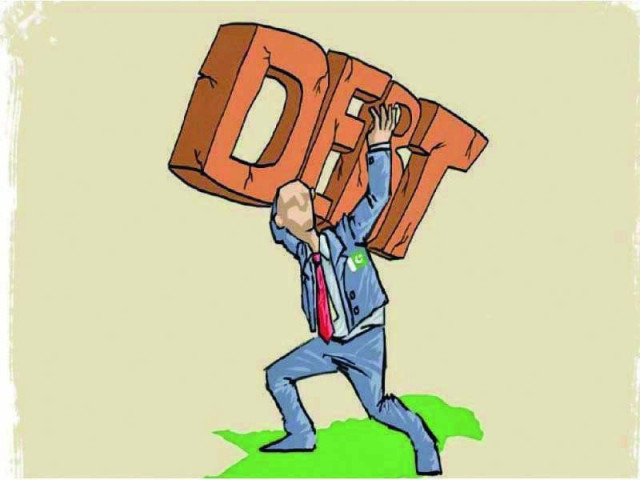Domestic debt to rise by Rs1 trillion
Govt to raise Rs6.72tr by selling debt securities to commercial banks

The government has planned on piling up domestic debt worth a whopping net Rs1 trillion in three-months (Feb-Apr), largely to meet its growing non-development expenditures including jacked-up interest payments.
The recent hike in the central bank’s key policy rate, coupled with the massive devaluation of the rupee, have both hit the government hard, increasing its reliance on debt to meet its expenditures despite a notable growth in the collection of taxes in the first seven-months of FY2023.
The finance minister has targeted raising a gross Rs6.72 trillion by selling debt securities, like T-bills and Pakistan Investment Bonds (PIBs), to domestic commercial banks until April 2023, the State Bank of Pakistan (SBP) said on Friday.
Of this, the government will repay commercial banks Rs5.70 trillion against their maturing debt securities, while it will utilise the remaining Rs1.01 trillion to finance the fiscal deficit in the three months.
Two of Pakistan’s major expense heads are debt servicing (interest payment) and defence. Cumulatively, these heads eat up around 70% of the total budget layout, it was learnt.
Speaking to the Express Tribune, Arif Habib Limited’s Economist Sana Tawfik said, “The government’s reliance on domestic debt is on the rise in wake of the latest hike in the key policy rate and a 16.52% devaluation in the rupee in the past week. Both measures, taken on the recommendation of the International Monetary Fund (IMF), have hit the government back hard.”
Apart from that, low collection of revenue in taxes has continued to increase the government’s reliance on debt, she said. “That is why the IMF is pressing the government to impose new taxes via a mini-budget to collect an additional Rs600 billion in FY23,” she said.
Alpha Beta Core (ABC) CEO, Khurram Schehzad said, “Every Rs10 depreciation against the US dollar leads to a Rs1.3 trillion addition to foreign debt.”
The domestic currency has devalued by Rs45.69 (or 16.52%) in the past seven days. Accordingly, foreign debt has gone up by Rs5.93 trillion.
Pakistan’s public debt increased 24% to Rs50.9 trillion in November 2022 compared to Rs40.9 trillion in November 2021.
Tawfik said “The resumption of the IMF programme is a must to reduce government reliance on domestic debt.”
“As a low collection of revenue has pushed the government to cut its development expenditures on things like roads and dams, most of the funds raised are being used to meet current and fixed expenditures (like government employees’ salaries and interest payments),” she said.
Noting that the collection of taxed revenue has increased by 17.4% to Rs3.43 trillion in the first half (Jul-Dec) of the current fiscal year 2023 compared to the same period of the last year, she said, “New tax measures worth Rs600 billion will help the government to reduce its reliance on debt.”
In its monthly economic update and outlook for January 2023, the government said it has adopted tight fiscal and monetary policies to combat the economic problems brought on by both internal and external forces.
Due to prudent spending management and effective domestic resource mobilisation, however, the fiscal deficit was not only confined to the same level of 1.4% of the GDP but the primary balance surplus was also maintained during the first five months, it said.
Published in The Express Tribune, February 5th, 2023.
Like Business on Facebook, follow @TribuneBiz on Twitter to stay informed and join in the conversation.



















COMMENTS
Comments are moderated and generally will be posted if they are on-topic and not abusive.
For more information, please see our Comments FAQ